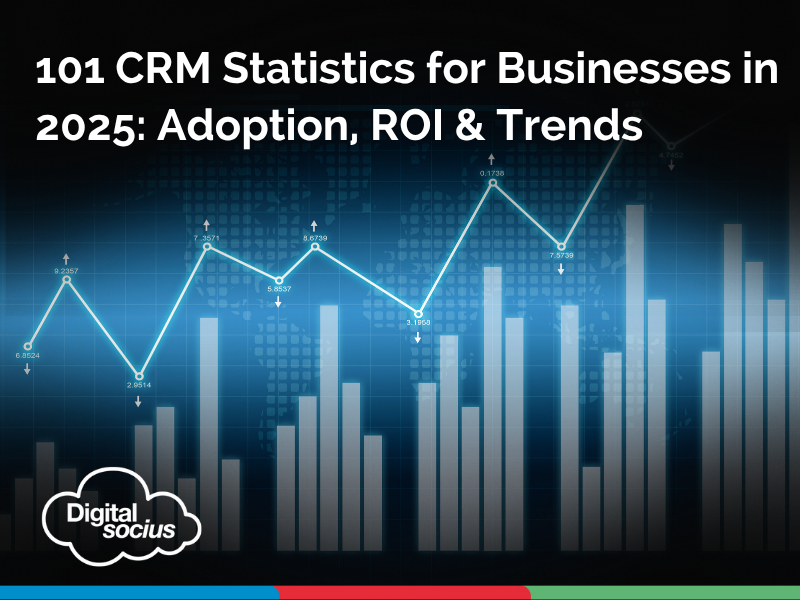Customer Relationship Management(CRM) software were initially viewed as just being a tool for sales. Over time, though, CRMs evolved into much broader platforms that also support marketing, customer service, analytics, and even operations.
They now act as a central hub for customer data, helping entire organizations build stronger relationships, manage customer data, improve productivity, and growth.
But beyond the perception, what does the data actually say?
We’ve rounded up 101+ of the most important CRM statistics for 2025, covering adoption, market growth, productivity gains, revenue impact, customer retention, AI and automation, and more. Use these stats to benchmark your own strategy, validate investment decisions, or simply stay ahead of trends shaping the CRM industry.
CRM Adoption Statistics
CRM adoption has become almost universal among larger firms, but for SMEs and startups, the picture is more mixed. While many have embraced CRM to boost productivity and sales, others still rely on spreadsheets or manual processes. These statistics show where adoption stands in 2025.
General Adoption Trends
- 91% of companies with 10+ employees use CRM software.
- 87% of businesses use cloud-based CRM platforms.
- 65% of businesses implement CRM within their first five years.
- 92% of organizations believe CRM is essential for revenue goals.
Cloud & Mobile CRM
- 70% of businesses use mobile CRM systems.
- Businesses using mobile CRM are 150% more likely to exceed sales goals.
- 81% of CRM users access systems from multiple devices.
SME & Startup Adoption
- CRM adoption among UK SMEs is growing at 12.6% YOY.
- 32% of UK SMEs still use spreadsheets to manage customer data.
- 50% of UK micro-businesses (<10 employees) do not use CRM systems.
- 71% of UK businesses overall (including micro) use CRM systems.
Business Impact of Adoption
- CRM usage increases sales by 29%, productivity by 34%, and forecast accuracy by 42%.
- 94% of businesses saw improved sales productivity after CRM implementation.
- 86% of SMEs using CRM rate their customer service as “exceptional” or “very good.”
Larger organizations have already embraced CRM, but the biggest adoption gap is among micro-businesses. For SMEs, CRM isn’t just a software upgrade, it’s a measurable driver of sales, retention, and customer service quality.
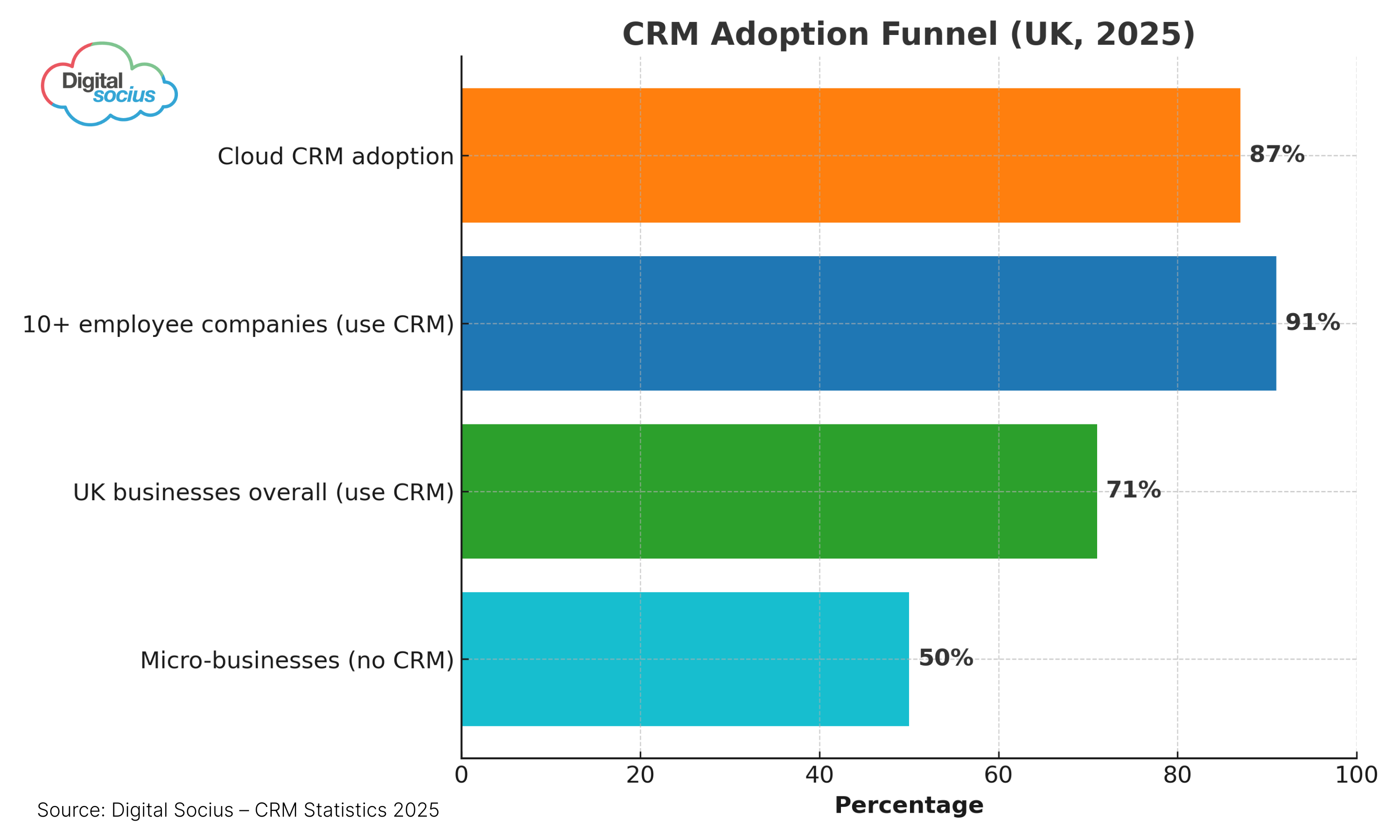
Source: Digital Socius – CRM Statistics 2025
CRM Market Size & Growth Statistics
It doesn’t do enough justice to say the CRM market is just growing; it’s exploding. Driven by cloud adoption, AI integration, and SME digital transformation, CRM continues to be the fastest-growing software category worldwide.
Global Growth
- CRM market projected to grow 12% annually through 2028.
- The global CRM market is expected to reach $129B by 2028.
- CRM remains the fastest-growing SaaS segment through 2030.
Market
Industry Forecasts
CRM is a global industry movement. For SMEs in the UK especially, the market is expanding at double-digit growth, making CRM adoption less of a question of if and more of when.
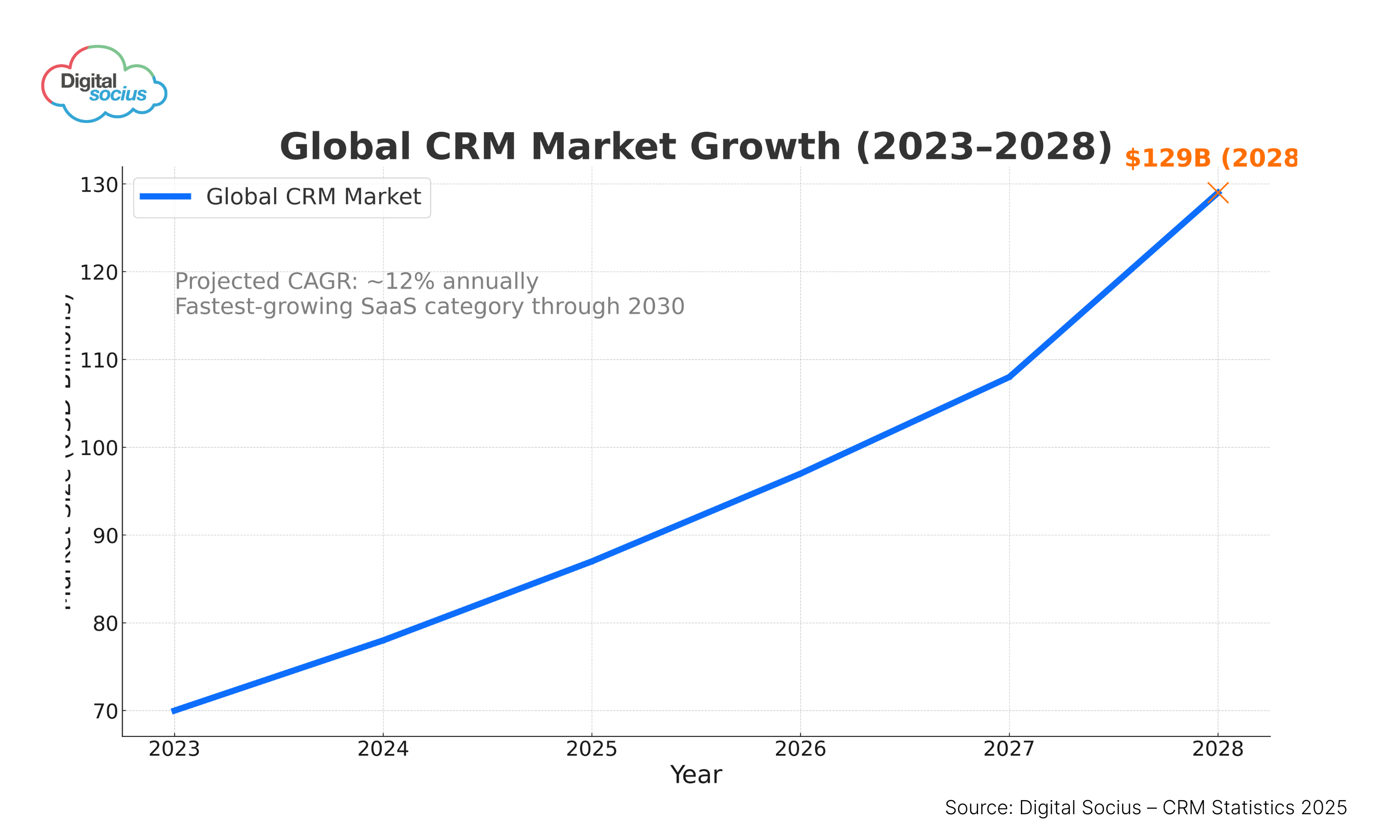
CRM Productivity Gains Statistics
One of the strongest business cases for CRM adoption is the measurable boost to productivity. From sales forecasting to customer service response times, CRMs are designed to cut down manual work and streamline workflows. These stats highlight exactly how much efficiency businesses are unlocking.
Sales Productivity
- CRM usage increases sales productivity by 34%.
- 41% of sales reps say CRM reduces time spent on admin tasks.
- Sales teams using CRM see 15% more time spent on selling activities.
- Companies that automate CRM processes increase lead response speed by 47%.
Marketing Efficiency
- Marketing teams using CRM see 25% higher campaign response rates.
- CRM reduces customer service costs by 23% on average.
- 65% of companies report better cross-team collaboration due to CRM.
Workflow & Team Collaboration
- CRM with workflow automation boosts productivity by 32%.
- Companies using CRM dashboards report 29% faster decision-making.
- Collaboration features in CRM reduce project delays by 22%.
- 81% of CRM users agree that their system has improved internal communications.
Productivity gains from CRM aren’t just theoretical, they show up in measurable efficiency across sales, marketing, and customer service. For SMEs with lean teams, the time saved on admin tasks can translate directly into growth activities like selling and client engagement.
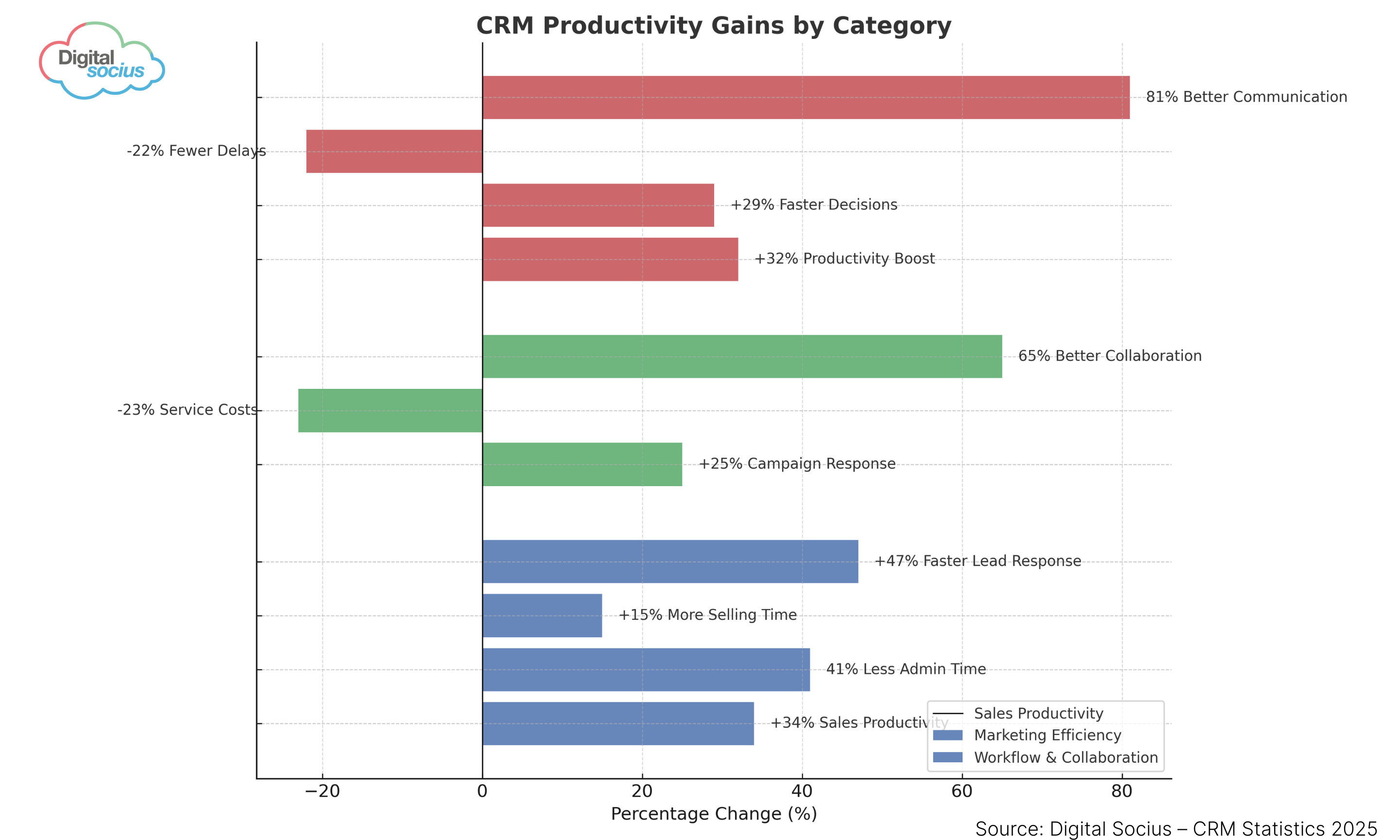
CRM Revenue Impact Statistics
At its core, CRM is about turning customer relationships into revenue. The numbers clearly show how CRM adoption translates into higher sales, better forecasting, and stronger bottom-line growth.
Direct Sales Impact
- CRM increases sales revenue by up to 41%.
- 45% of businesses report increased sales revenue after CRM adoption.
- Businesses that automate CRM see a 29% boost in sales revenue.
- Companies using CRM are 86% more likely to exceed sales goals
Customer Lifetime Value Impact
- CRM adoption boosts customer lifetime value by 30%.
- CRM users see a 27% improvement in customer retention rates.
- 99% of B2B companies use CRM specifically to retain customers.
Forecasting & Deal Management
- CRM usage improves forecast accuracy by 42%.
- 61% of sales leaders say CRM gives better visibility into pipeline health.
- Companies using AI-enhanced CRM report 25% faster deal closures.
CRM is one of the few business tools with a direct and measurable impact on revenue. From faster deal cycles to stronger customer retention, the link between CRM adoption and top-line growth is too strong for SMEs to ignore.
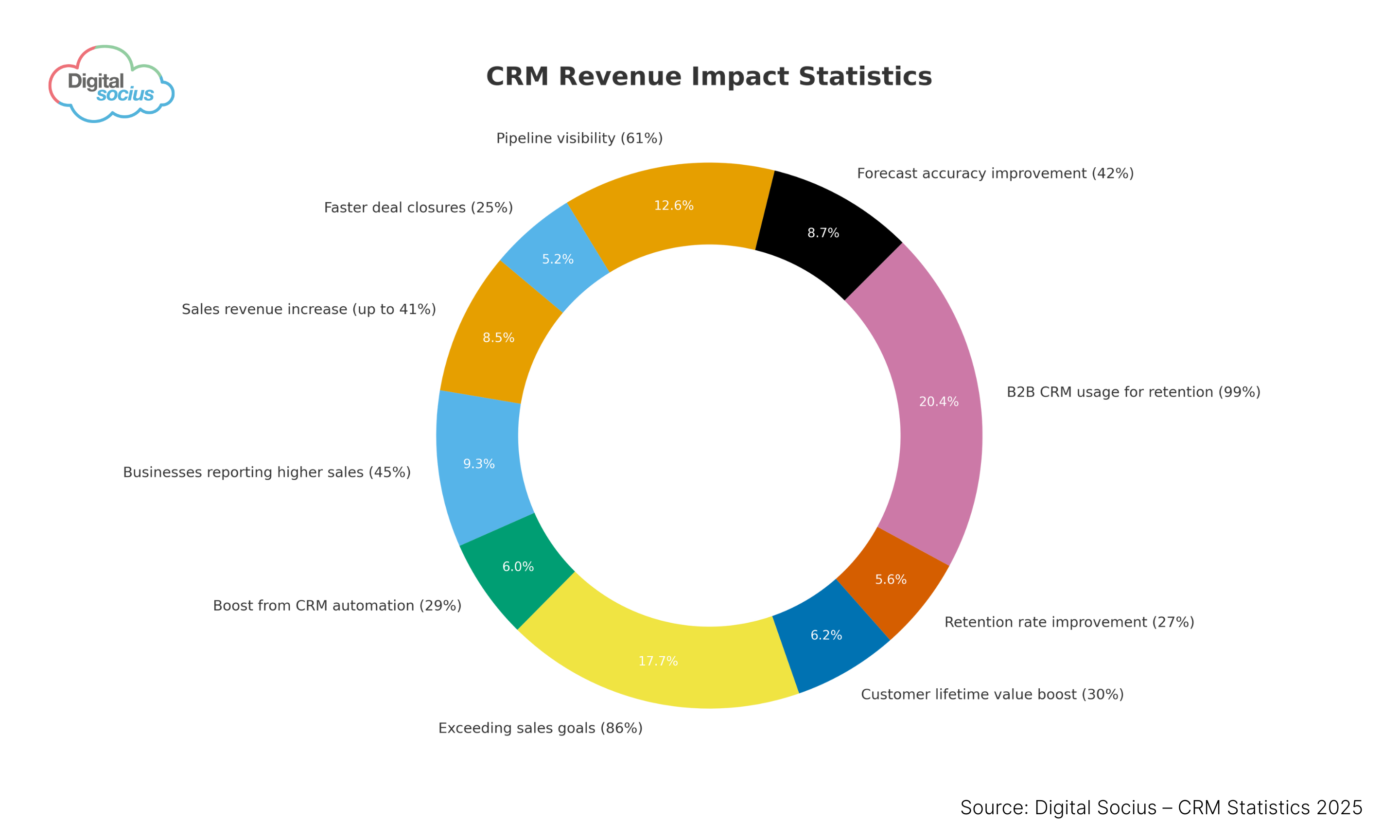
CRM Customer Retention & Experience Statistics
Customer loyalty is the lifeblood of SMEs, and CRM systems are designed to nurture exactly that. From personalized communication to proactive support, CRMs make it easier to keep customers engaged — and the stats back it up.
Customer Retention & Loyalty
- CRM adoption boosts customer retention rates by 27%.
- 47% of businesses report higher customer retention after implementing CRM.
- 80% of customers are more likely to stay with brands that personalize communication using CRM data.
Customer Experience & Service
- Customer service agents using CRM resolve issues 17% faster.
- CRM-powered personalization improves customer satisfaction by 33%.
- 54% of customers expect personalized experiences — which CRM enables at scale.
Long-Term Business Impact
- Increasing customer retention by 5% boosts profits by 25%–95%.
- Companies using CRM for customer experience see a 30% increase in upsell/cross-sell revenue.
- High-performing businesses are 1.6x more likely to use CRM for customer insights.
Retaining a customer is always cheaper than acquiring a new one — and CRM gives SMEs the tools to do both. The stats show a clear link: CRMs not only reduce churn but also create a foundation for upselling and long-term loyalty.
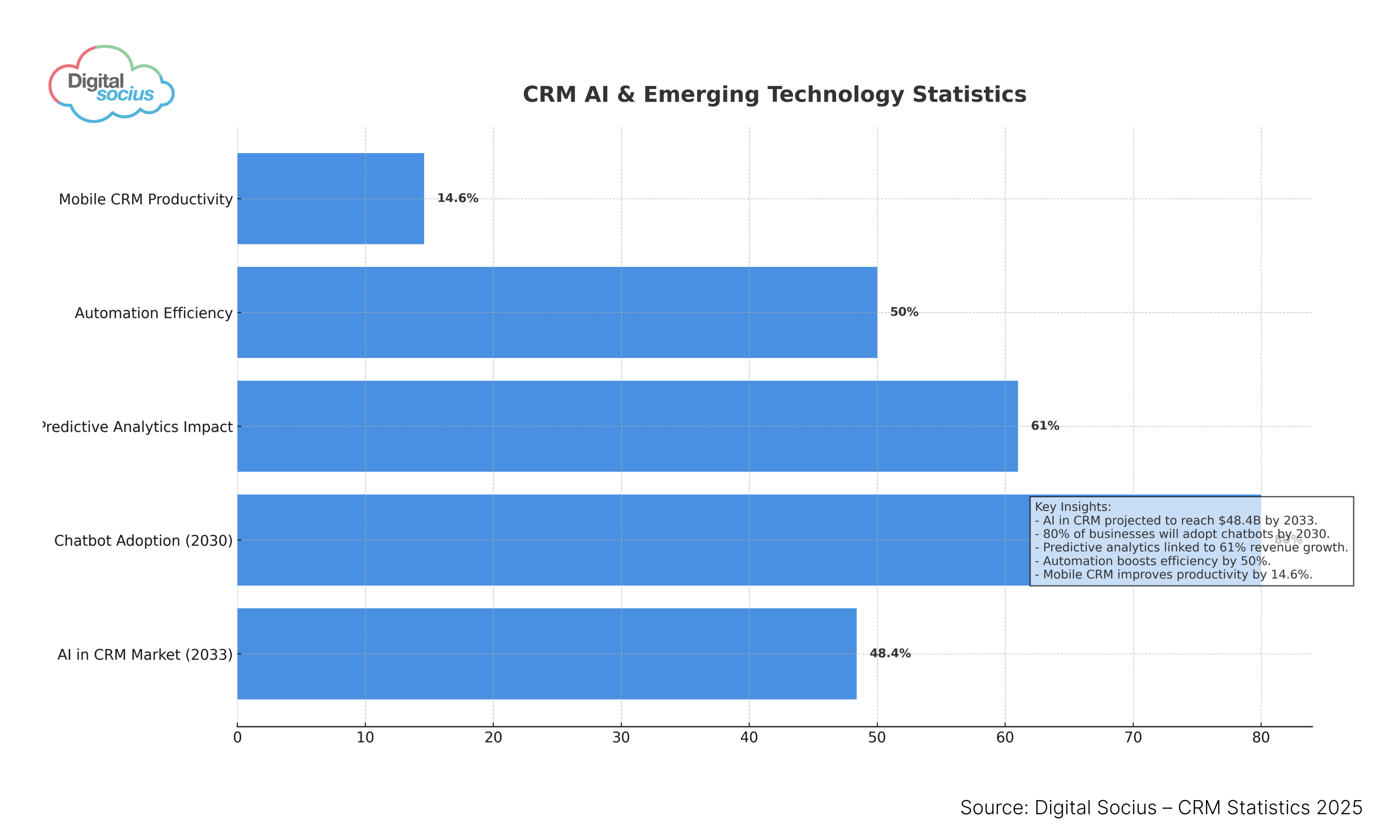
Industry-Specific CRM Statistics
Sales & Marketing
- 91% of companies with more than 11 employees now use a CRM primarily for sales and marketing management.
- 73% of sales teams report higher productivity after adopting CRM tools.
- 65% of businesses have adopted CRM systems with generative AI for campaign execution.
These stats confirm CRM remains a sales-marketing powerhouse, but also hint at saturation — making differentiation through integrations and personalization crucial.
Retail & E-commerce
- Over 60% of loyalty programs make most shoppers more loyal to a brand.
- Retailers using CRM for omnichannel campaigns see a 23% lift in customer spend compared to those without CRM.
Financial Services
- 82% of financial service providers (banks, credit unions, fintechs) say CRM has improved customer satisfaction scores.
- Firms that integrate CRM with compliance tracking see a 20% faster client onboarding time.
Healthcare
- 63% of healthcare organisations use CRM primarily for patient engagement and communication.
- Clinics using CRM for reminders and follow-ups report a 29% reduction in no-show rates.
Even outside “traditional business,” CRM adoption proves valuable. For SMEs in healthcare, CRM is increasingly seen as a patient management tool.
Real Estate & Professional Services
- CRM is the second most effective lead-gen tool among realtors.
- Professional service firms (legal, accounting, consulting) using CRM see a 25% higher client retention rate than those without.
CRM isn’t a one-size-fits-all tool. In sales-heavy industries, it drives pipeline growth; in regulated ones, it improves compliance; and in service sectors, it deepens relationships. SMEs can learn from these sector benchmarks to set realistic goals for their own CRM success.
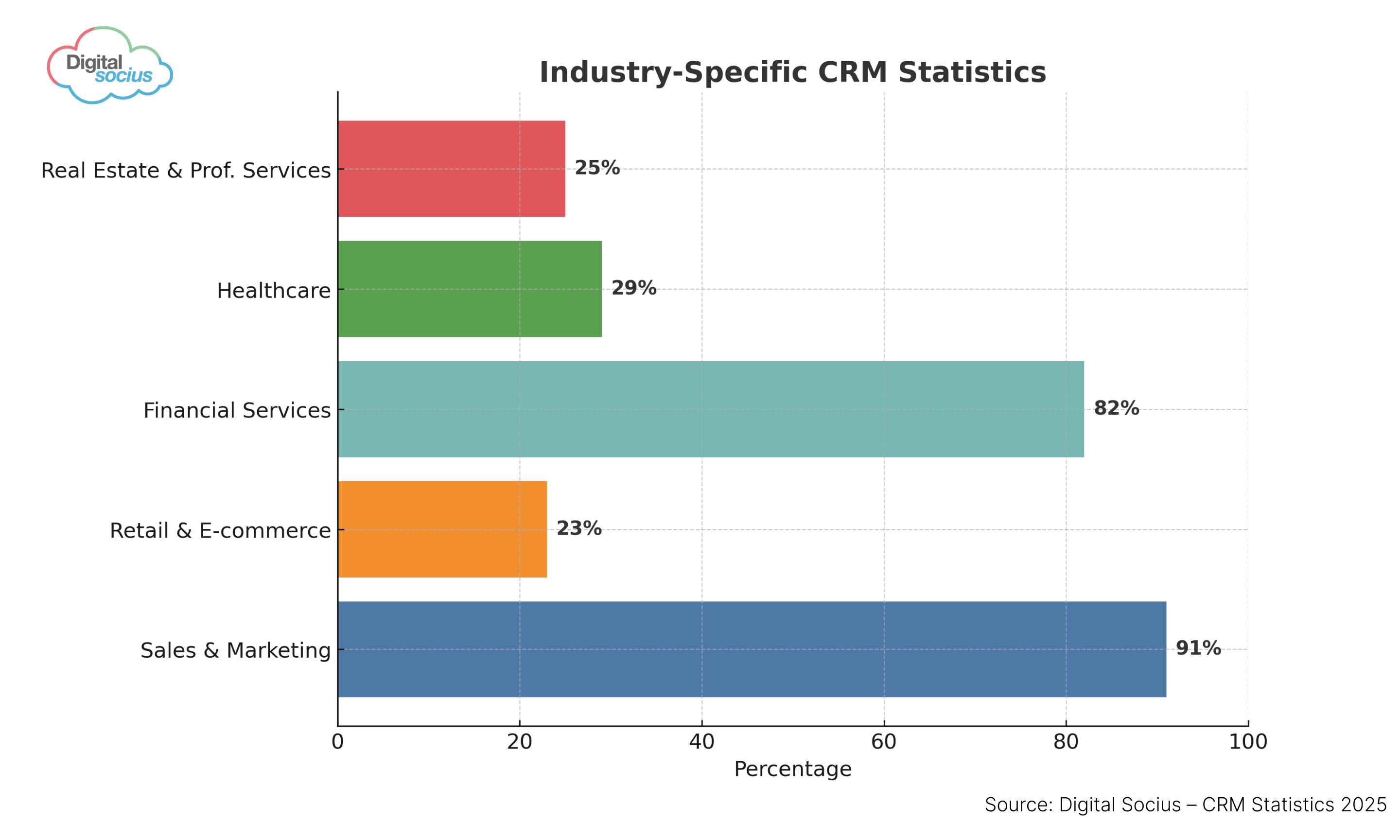
CRM AI & Emerging Technology Statistics
AI in Sales & Forecasting
- Companies using AI-enabled CRM report a 50% boost in lead generation.
- AI improves sales forecasting accuracy by 42%.
- Businesses with AI-driven CRM shorten deal cycles by 25%.
AI in Customer Service & Engagement
- 61% of CRM users say AI chatbots improve response times significantly.
- Companies that use AI-driven CRM for customer interactions report a 47% increase in satisfaction.
Emerging Technology Trends
- 65% of businesses say AI will be the most critical CRM feature by 2026.
- Voice-enabled CRM usage is projected to grow 17% annually.
- 40% of SMEs are considering AI-driven personalization engines for their CRM within the next two years.
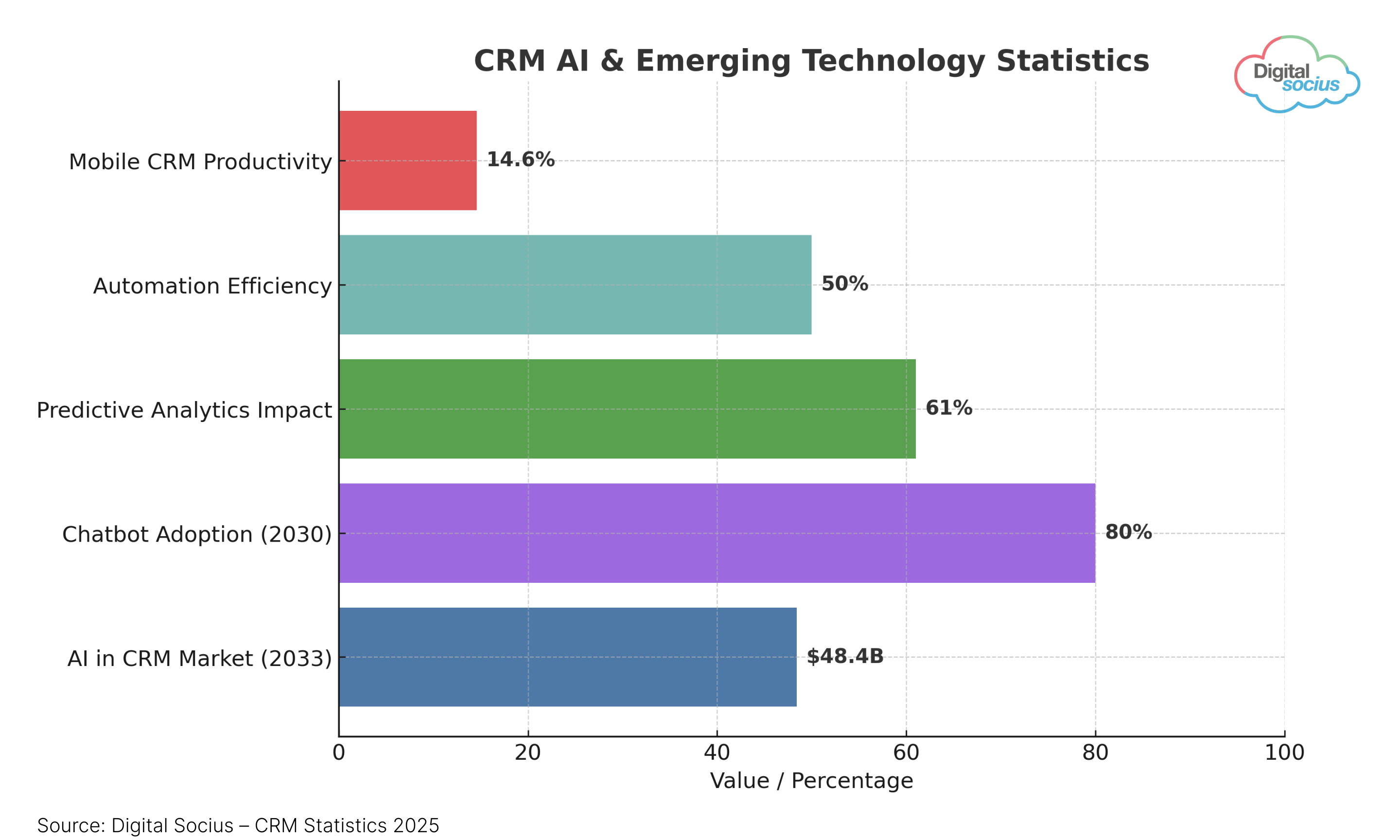
CRM User Preferences & Challenges Statistics
Adoption Barriers
- 43% of SMEs cite cost as their biggest barrier to CRM adoption.
- 42% say internal skill shortages limit their ability to fully implement CRM.
- 48% of SMEs report difficulty addressing internal skills gaps.
- 36% of CRM users abandon platforms due to complexity.
- 33% of failed implementations are linked to lack of executive buy-in.
Implementation & Failure Rates
- Between 30–70% of CRM projects fail to meet expectations.
- 18% of CRM projects fail outright.
- 63% of implementations exceed budgets or timelines.
- 47% of CRM failures stem from poor user adoption.
User Preferences
- 65% of CRM users say training is essential for success.
- 58% feel overwhelmed by feature complexity.
- 49% report onboarding takes longer than expected.
- 44% of users believe ongoing vendor support is critical.
- 52% of SMEs lack internal “CRM champions” — power users who advocate for adoption.
CRM adoption challenges often boil down to people and processes, not software. For SMEs, success depends on aligning leadership, staff, and training with the chosen platform.
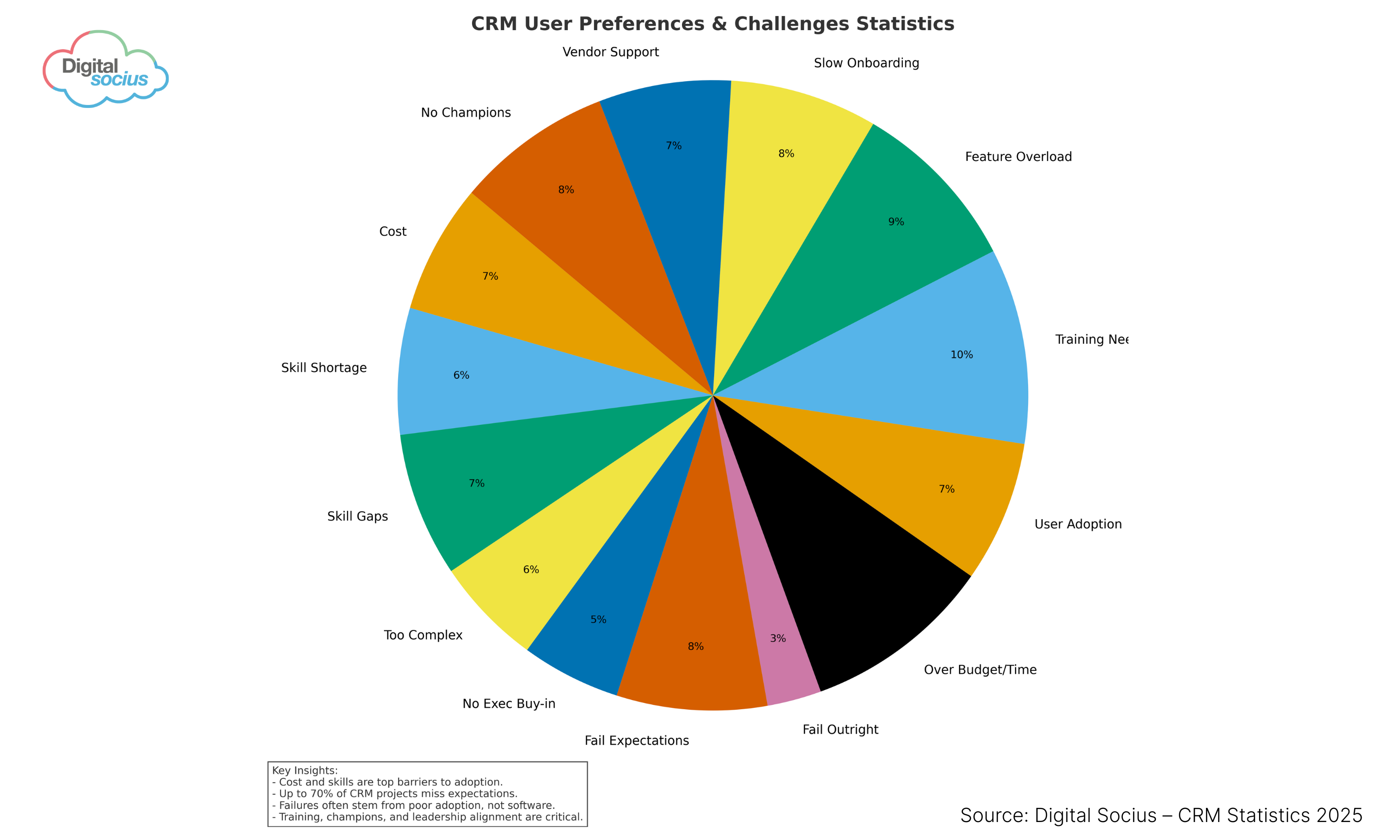
CRM Security & Compliance Statistics
Data Breach & SaaS Risks
- 43% of data breaches now target SaaS platforms, including CRM.
- 38% of CRM users have already experienced a data breach.
- 27% of CRM users worry about third-party data exposure.
- 60% of SMEs lack formal CRM security policies.
GDPR Compliance
- 89% of CRM vendors claim GDPR compliance.
- 66% of SMEs use CRM tools to manage GDPR consent and data rights.
- 54% of CRM users rely on built-in GDPR management features.
- 41% of SMEs still struggle with GDPR implementation.
- 73% of CRM vendors offer data portability features, a GDPR requirement.
SME Security Confidence
- 62% of SMEs say they feel confident in their CRM data protection.
- 48% still worry about vendor data handling practices.
- 55% of SMEs use multi-factor authentication in CRM platforms.
- 67% prefer cloud CRM for its stronger security controls.
- 71% of SMEs now conduct annual CRM security audits.
- 69% of SMEs say CRM improves overall regulatory readiness.
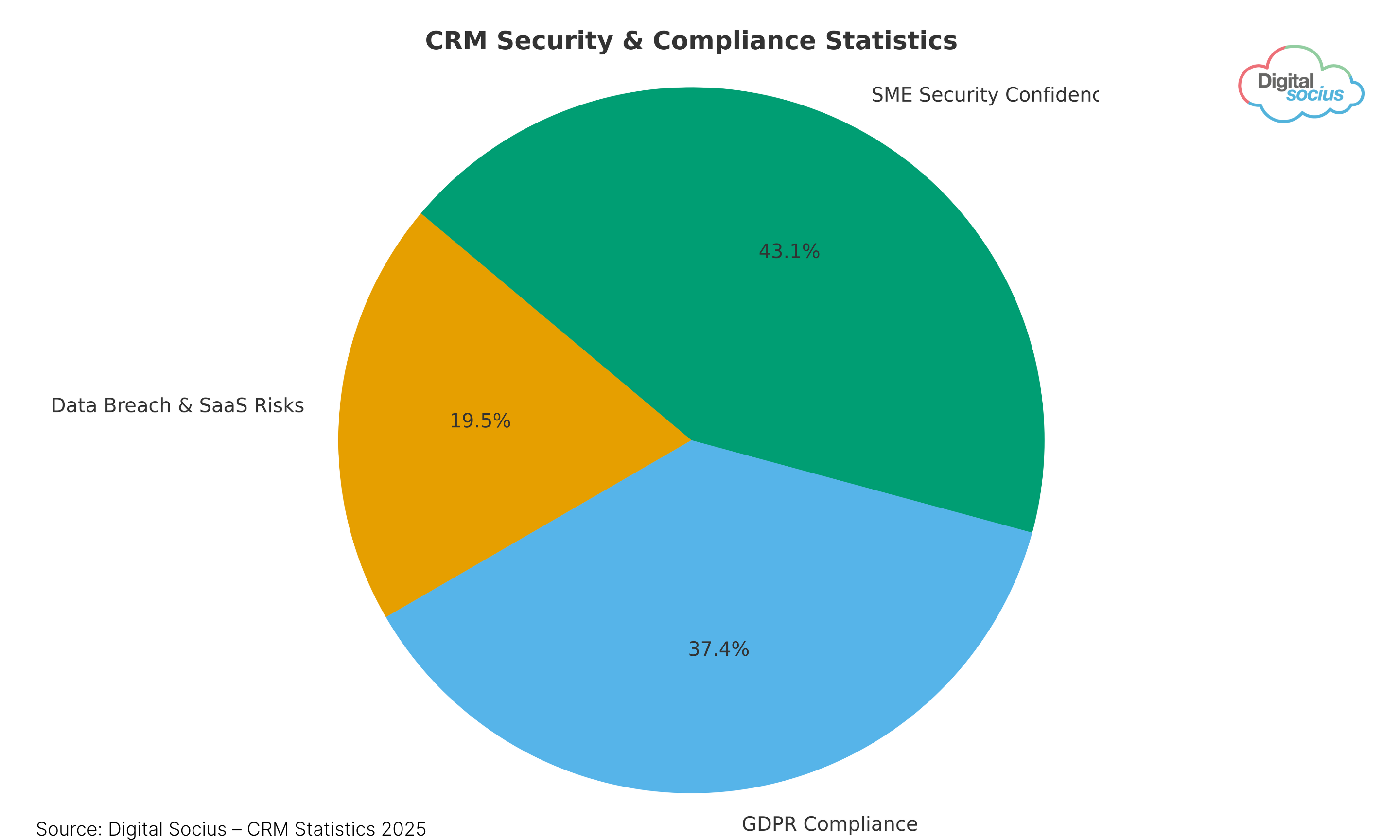
The Future of CRM: 2025 & Beyond
CRM is no longer just a database of contacts. It’s evolving into the central nervous system of SMEs, powered by AI, integrations, and predictive analytics. The statistics show that the next few years will be defined by personalization, automation, and intelligent insights.
AI-First Future
- By 2026, 65% of businesses say AI will be the most critical CRM capability.
- AI-driven CRMs are expected to create $1.1 trillion in new business value globally by 2030.
- 75% of sales teams say AI in CRM will be essential for competitiveness by 2028.
Hyper-Personalization & CX
- 80% of customers expect CRM-driven personalization in all business interactions.
- By 2027, 70% of SMEs plan to use CRM data to power real-time personalization.
- 68% of SMEs say customer experience will be their top CRM investment driver in the next 3 years.
Connected Workflows & Ecosystems
- 74% of SMEs say integration with other business tools will be their #1 priority for CRM selection by 2026.
- 59% plan to expand CRM into ERP, HR, or finance integrations.
- 71% of SMEs will rely on CRM as their single source of truth across operations.
Market Outlook
- The global CRM market is forecast to exceed $160 billion by 2030, growing at nearly 14% CAGR.
- Cloud CRM will make up 90% of the market by 2031.
- 60% of SMEs say they plan to increase CRM spending year-on-year through 2030.
The future of CRM is intelligent, integrated, and indispensable. For SMEs, the shift from optional to essential is already happening — the question isn’t “if” to adopt, but how fast to evolve alongside these changes.
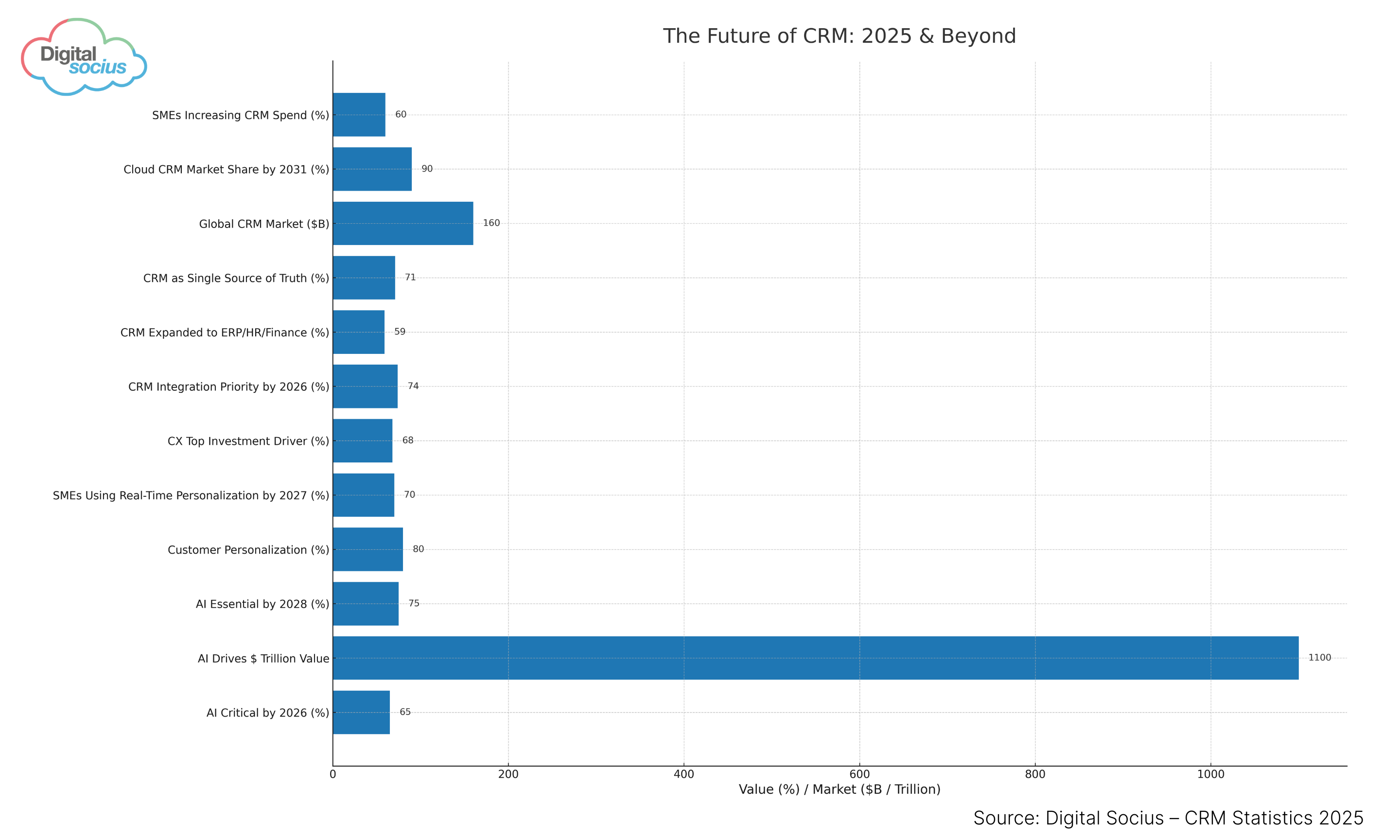
What These CRM Statistics Mean for SMEs in 2025
The numbers speak for themselves: CRMs are now crucial to of modern business operations. Whether it’s boosting productivity, driving revenue growth, improving retention, or keeping SMEs compliant with regulations, CRM tools are proving their value across every corner of business life.
A few key themes cut across all 101+ statistics:
- Adoption is mainstream — most larger firms already use CRM, and SMEs are quickly following suit.
- Cloud and AI are non-negotiable — the future of CRM is mobile-first, cloud-based, and intelligent.
- Customer experience is king — businesses that use CRM effectively are seeing measurable gains in satisfaction, loyalty, and lifetime value.
- Integration and simplicity win — SMEs want CRMs that work seamlessly with their existing tools, without unnecessary complexity.
For SME decision-makers, the takeaway is clear:
CRM is a strategic advantage. The businesses that adopt it thoughtfully and use it fully will be the ones that grow fastest, serve customers best, and stay competitive in the years ahead.
If you’re weighing your options, consider not just which CRM fits your budget today, but which one can grow with your business tomorrow. The stats show the trajectory: more automation, more intelligence, more customer centricity. The sooner you align with that future, the more rewards your business will unlock.
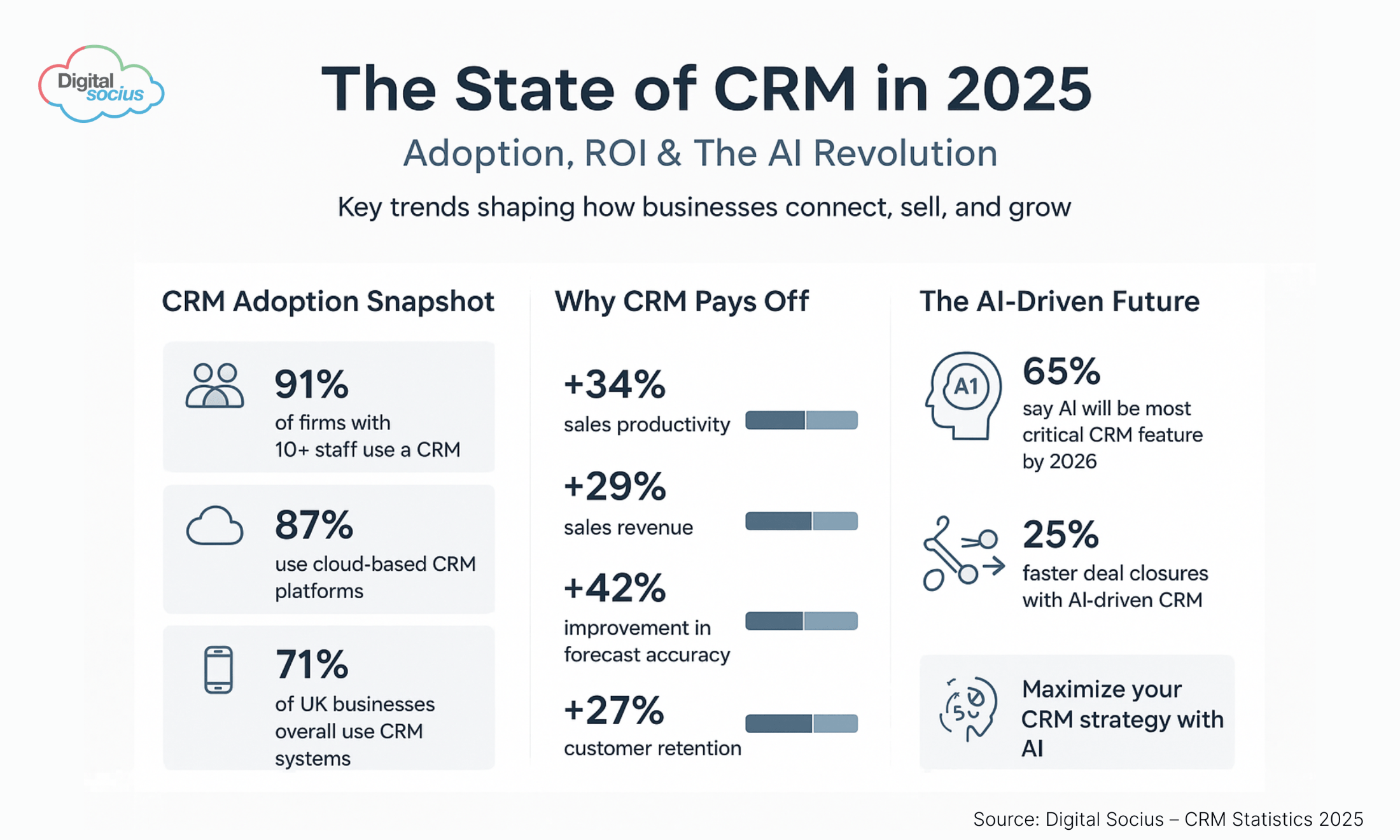
CRM Statistics 2025: Adoption, ROI, AI & Future Trends – Digital Socius
Frequently Asked Questions About CRM in 2025
1. What is the average cost of a CRM for SMEs in the UK?
CRM pricing varies, but most SME-friendly solutions range from £12 to £50 per user per month. Enterprise tools like Salesforce can cost significantly more, while options like Zoho CRM or HubSpot offer flexible tiers suited for small businesses.
2. How long does it take to implement a CRM?
On average, SMEs can implement a CRM in 1–3 months, depending on the complexity of integrations and data migration. Simpler, cloud-based CRMs can be up and running in days.
3. Is a CRM worth it for businesses with fewer than 10 employees?
Yes. Even micro-businesses benefit from centralizing customer data, automating follow-ups, and improving sales tracking. However, adoption is lower in this segment because some rely on spreadsheets until growth pressures make CRM essential.
4. Which CRM is best for SMEs in 2025?
The “best” CRM depends on business needs. Popular SME-friendly options in the UK include Zoho CRM (affordable, flexible), Salesforce Essentials (scalable), and HubSpot (good for marketing integration). Decision-makers should consider ease of use, integrations, and long-term scalability.
5. What’s the difference between CRM and ERP?
CRM (Customer Relationship Management) focuses on managing customer data, sales, and marketing. ERP (Enterprise Resource Planning) handles back-office processes such as finance, HR, and supply chain. Many SMEs adopt CRM first, then integrate with ERP later as they scale.
6. How do CRMs help with GDPR compliance?
Modern CRMs include tools for data consent management, access tracking, and secure storage. This helps SMEs meet GDPR requirements and reduce compliance risks.
Ready to Put These CRM Insights into Action?
Digital Socius helps UK SMEs choose, customise, and implement the right CRM — without the complexity or wasted spend.
Book a free consultation today and start turning CRM stats into measurable results for your business.
